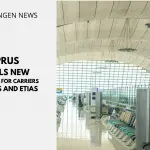Post Study Work Options: Getting a Work Visa for Liechtenstein
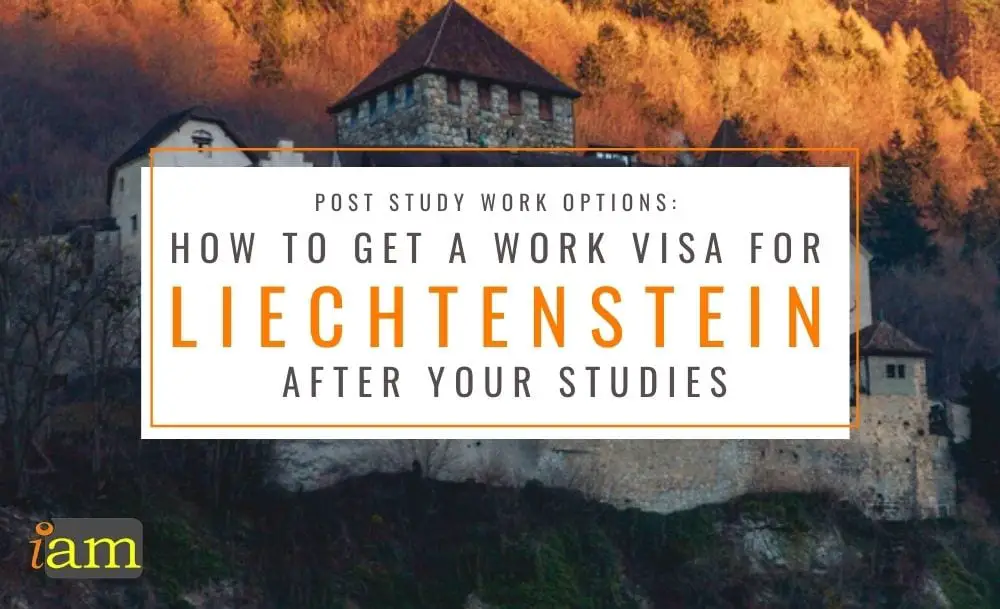
Liechtenstein is a landlocked country in Central Europe bordered by Switzerland to the west and south and Austria to the east and north. Around half of Liechtenstein lies in the mountains so you can just imagine the beautiful scenery you will wake up to everyday.
Liechtenstein is a constitutional monarchy and has one of the highest GDP per capita in the world. The country has a literacy rate of 100%, with schooling being a priority for most of the population. Because of high-quality education, it is possible to maintain the innovative drive in the economy, state and society.
Liechtenstein is Europe's fourth-smallest country, with an area of just over 160 square kilometres and home to less than 40,000 people. Excellent transport connections with both Austria and Switzerland makes it easy to get to Liechtenstein. Because of the growing economy, citizens of Liechtenstein benefit from one of the highest wage levels across Europe with a low level of unemployment but it is also rated with high living expenses.
There are three main sectors of the economy:
- Industries and manufacturing – machine and plant construction, precision tools, dental instruments and the food industry)
- Financial/asset management – banking and financial services
- Agriculture and forestry – accounts for 0.8 percent economic sector
Half of the workforce in the country lives in the neighbouring nations like Switzerland, Austria and Germany. This means that every day, half of the workforce commutes from abroad and they are widely known as cross-border commuters.
Although Liechtenstein does not have an automatic extension program for foreign nationals who have graduated from the local university, you can check your immigration options if you wish to stay in the country after completing your studies.
Migration Policy
Liechtenstein has a very strict policy regarding foreign nationals who wish to enter the country so residence permits are very difficult to obtain.
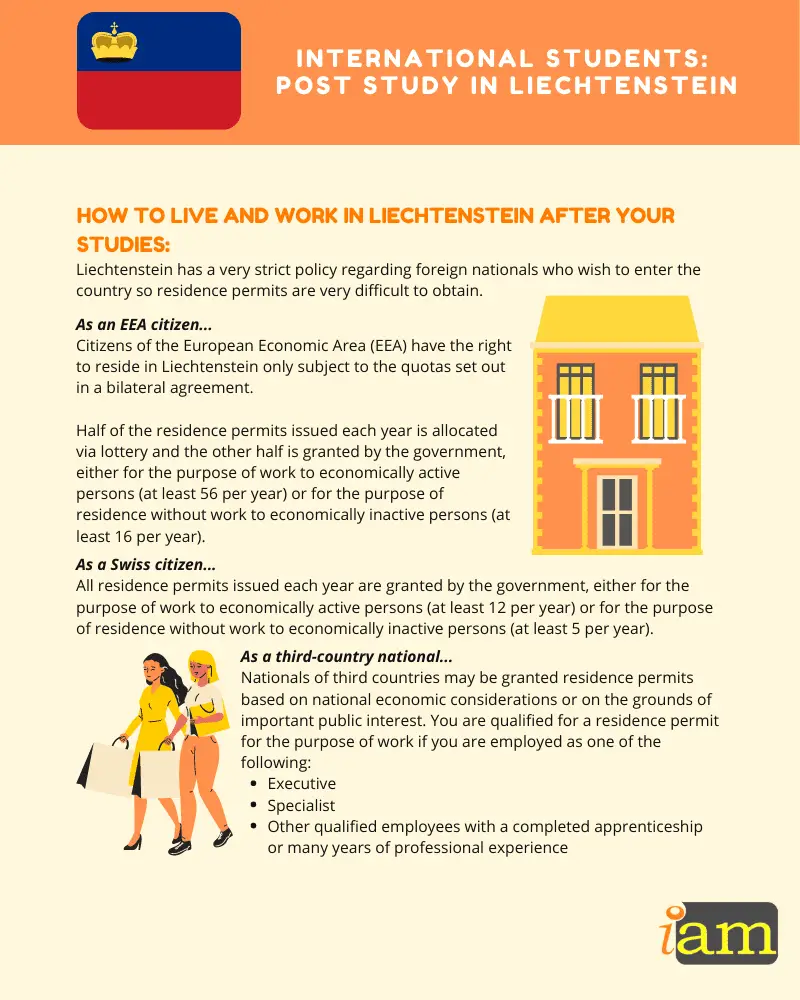
Although Liechtenstein is not a member of the European Union, it participates in both the Schengen Area and the European Economic Area (EEA). With the exception of a short-term tourist visit of three months, any stay in Liechtenstein requires a permit. Citizens of the European Economic Area (EEA) have the right to reside in Liechtenstein only subject to the quotas set out in a bilateral agreement.
Foreign nationals wishing to live in Liechtenstein require a residence permit. A total of 89 residence permits are granted by the government each year to citizens of EEA states and Swiss nationals.
Third country nationals must be managers, specialists or qualified workers with a completed apprenticeship or many years of working experience in order to receive a residence permit.
The residence permit in principle entails the right for a spouse and children under the age of 21 to reside in Liechtenstein as well. The residence permit is valid for up to 5 years.
The residence permits in Liechtenstein are issued based on your nationality and grouped into three categories.
- EEA nationals
EEA nationals are nationals of the following countries: Austria, Belgium, Bulgaria, Croatia, Cyprus, Czech Republic, Denmark, Estonia, Finland, France, Germany, Greece, Hungary, Iceland, Ireland, Italy, Latvia, Liechtenstein, Lithuania, Luxembourg, Malta, Netherlands, Norway, Poland, Portugal, Romania, Slovakia, Slovenia, Spain, Sweden, Switzerland and the United Kingdom.
Half of the residence permits issued each year is allocated via lottery and the other half is granted by the government, either for the purpose of work to economically active persons (at least 56 per year) or for the purpose of residence without work to economically inactive persons (at least 16 per year).
- Swiss citizens
All residence permits issued each year are granted by the government, either for the purpose of work to economically active persons (at least 12 per year) or for the purpose of residence without work to economically inactive persons (at least 5 per year).
- Third-country nationals
Nationals of third countries may be granted residence permits based on national economic considerations or on the grounds of important public interest.
For non-EU/EEA and Swiss nationals, you are qualified for a residence permit for the purpose of work if you are employed as one of the following:
- Executive
- Specialist
- Other qualified employees with a completed apprenticeship or many years of professional experience
Cross Border Work Permits
Workers living outside Liechtenstein, known as cross-border commuters, are subject to a range of different provisions in order to receive a permit.
EU/EEA citizens that work in Liechtenstein must register with the authorities at the local Migration and Passport Office within 10 days from starting work.
Non–EU/EEA and Swiss nationals must apply for a cross-border commuter permit before starting to work in Liechtenstein. This permit is valid for one year, if certain conditions are met. The application for the permit is submitted to the Migration and Passport Office at least 14 days before the first day of work. Applicants can only start work in Liechtenstein once they have been granted a cross–border commuter permit.
Residence in Liechtenstein for gainful employment
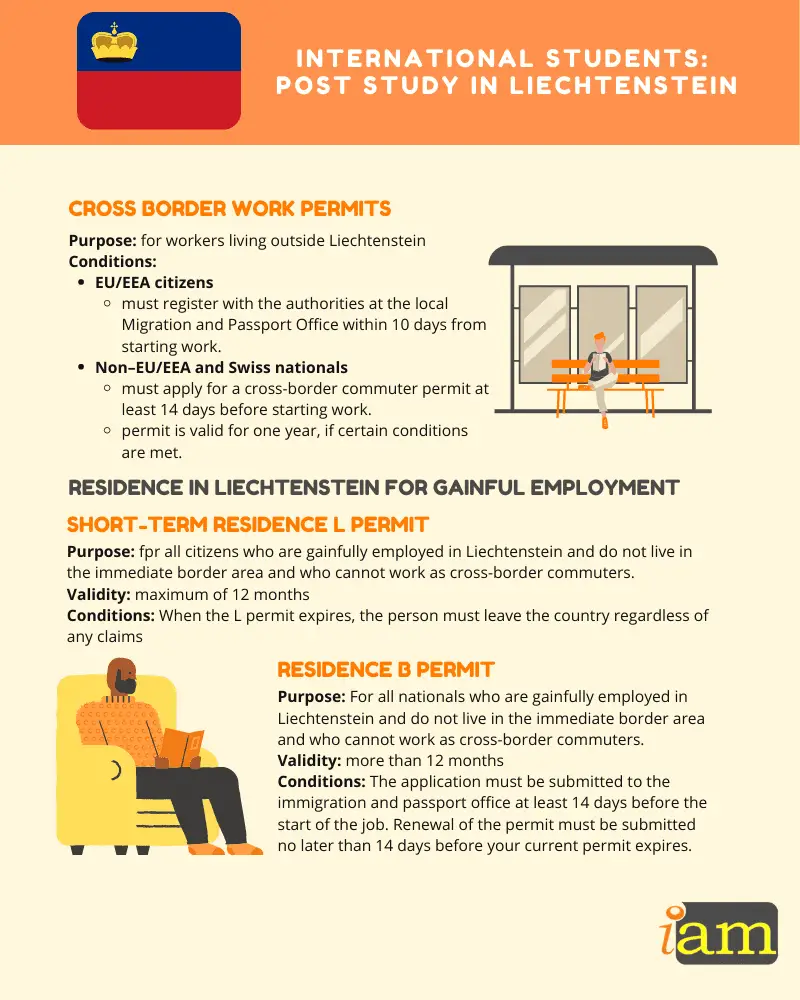
Short-term Residence L permit
All citizens who are gainfully employed in Liechtenstein and do not live in the immediate border area and who cannot work as cross-border commuters.
The L permit entitles you to take up residence in Liechtenstein for a maximum of 12 months. When the L permit expires, the person must leave the country regardless of any claims
Residence B Permit
All nationals who are gainfully employed in Liechtenstein and do not live in the immediate border area and who cannot work as cross-border commuters.
The Residence B permit entitles you to take up residence in Liechtenstein for more than 12 months.
The application must be submitted to the immigration and passport office at least 14 days before the start of the job. Renewal of the permit must be submitted no later than 14 days before your current permit expires.
For EEA and Swiss applications, the process usually takes four weeks upon receipt of the application. Applications from non-EEA or Swiss nationals usually take three months upon receipt.
Related Articles:
- Post Study Work Options: How to Get a Work Visa in Latvia After Studies
- Iceland Post Study Work Visa – How to Get a Work Visa for Iceland
- Post Study Options: How to Get a Work Visa in Hungary After Your Studies
Permanent residence
Liechtenstein has different approaches on the issue of obtaining a permanent residence. The process of granting permanent residence will be depending on your nationality.
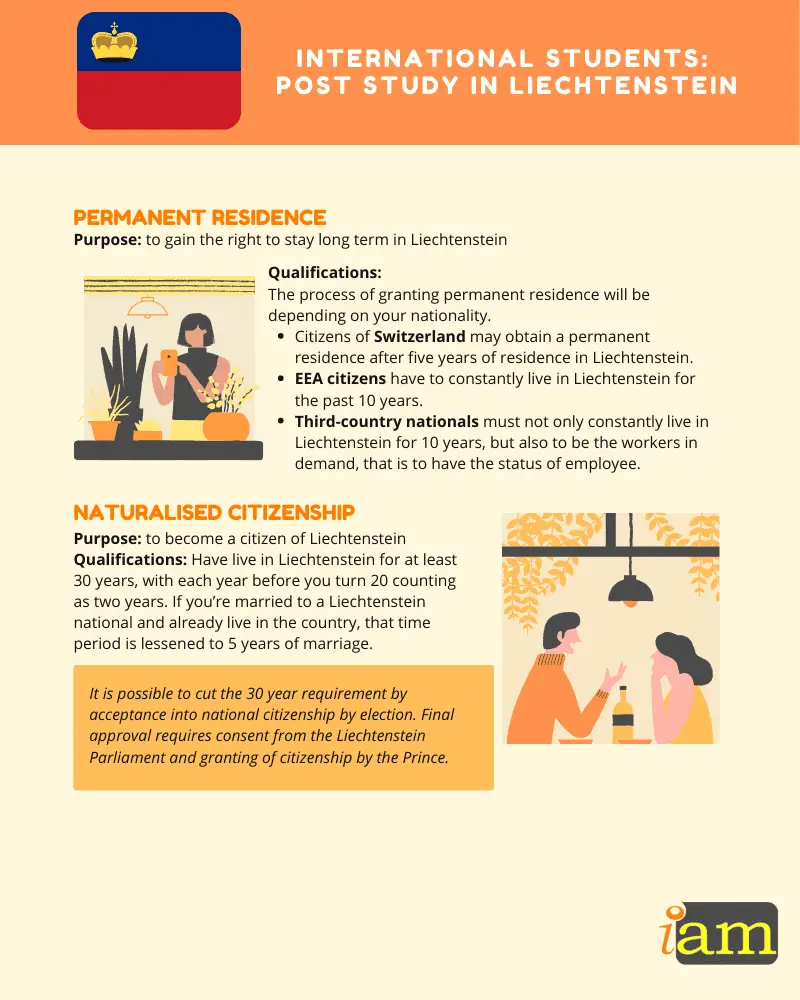
- The citizens of Switzerland may obtain a permanent residence after five years of residence.
- EEA citizens have to constantly live in Liechtenstein for the past 10 years.
- Third-country nationals must not only constantly live in Liechtenstein for 10 years, but also to be the workers in demand, that is to have the status of employee.
Naturalised Citizenship
It is a bit harder to get citizenship in the country. If you want to become a citizen, you need to live in Liechtenstein for at least 30 years, with each year before you turn 20 counting as two years. If you're married to a Liechtenstein national and already live in the country, that time period is lessened to five years of marriage.
It is possible to cut the 30 year requirement by acceptance into national citizenship by election. Through this method, the voting population of the community of residence will vote on whether you should be accepted as a Liechtenstein citizen. Final approval requires consent from the Liechtenstein Parliament and granting of citizenship by the Prince.
The country does not allow dual citizenship for naturalised residents so you have to renounce your current citizenship to be a national of Liechtenstein.
Will you be one of the lucky few to be granted a Liechtenstein work permit? Comment below.
IaM can help with your visa application to the United States, the UK & other countries
If you need help with a US visa, a UK Visa, or visa to Europe, including help with appointment booking obligations, IaM can help. For more information and advice on US immigration, UK immigration law and US visa applications or if you need any help or assistance please, reach out to your Visa Coordinator at IaM.


